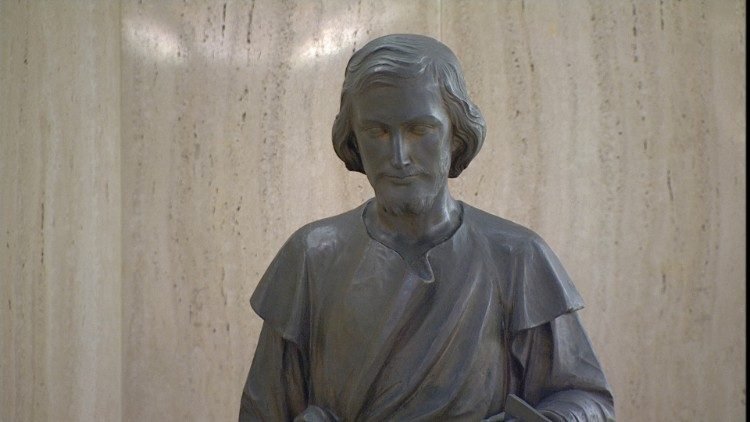Pope Francis celebrated Mass on 1 May at the Casa Santa Marta next to the same statue of St. Joseph the Worker that was with Pope Pius XII in 1956, the year after the institution of the solemnity dedicated to the Virgin’s Husband.
By Alessandro De Carolis
The scene was similar to one that occurred 64 years before, minus the crowds due to the Covid-19 pandemic. But the same Patron Saint of workers was present. He watches over a category of people who are currently hard-hit by a microscopic adversary, just as before he interceded for that same segment of society, which at the time was called upon to rebuild post-war Italy.
From Milan to Rome
Beyond the historical differences, numerous similarities surround the statue of St. Joseph which arrived in the Vatican on Thursday evening. It was placed in the chapel of the Casa Santa Marta, ahead of the Friday morning Mass celebrated by Pope Francis, on the Solemnity of St. Joseph the Worker.
In 1956 the same image – blessed on 1 May by the then-Archbishop of Milan, Giovanni Battista Montini – left for Rome by helicopter on 2 May to be blessed also by Pope Pius XII at the audience granted that same day to ACLI (Christian Association of Italian Workers). The audience took place 12 months after the Mass in which Piux XII had dedicated the liturgical feast celebrated by workers around the world to the Spouse of Mary and Jesus’ foster father.
In procession
Then as now, members of ACLI acted as protagonists. They wanted to bring Pope Francis the statue made in gilded bronze by the sculptor Enrico Nell Breuning. The 150-centimeters-tall statue is usually housed in the Association’s headquarters in Rome.
Already once before, the statue had been placed not far from Pope Francis when it was taken in procession to an audience in the Paul VI Hall, on 23 May 2015.
Freely-associated work and solidarity
These are just a few of the elements that intertwine the present – with the numerous anxieties that have lately upset the world of work – to the past.
As the national president of ACLI, Roberto Rossini, writes, it is the “memory of those who have preceded us” which “encourages us to make it so that – as you have repeatedly pointed out, Your Holiness – no worker is without rights and work is freely-associated, creative, participatory, and mutually supportive.”



